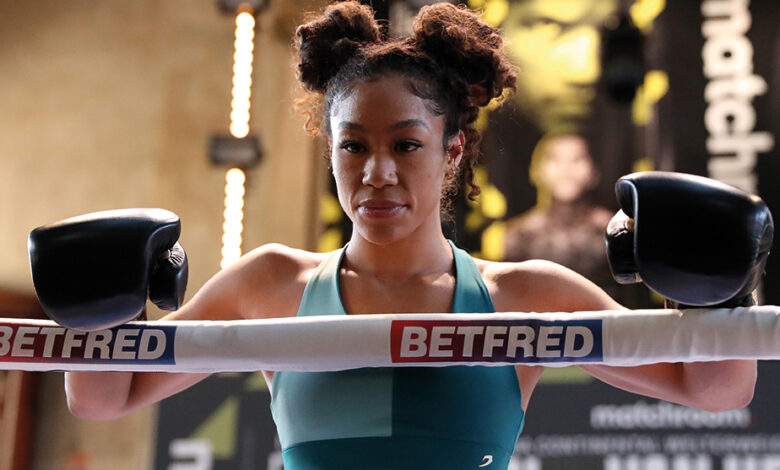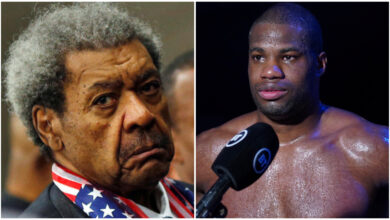The Beltline: Before they are banned from competing, boxers caught using performance-enhancing drugs should be banned from using their phone

BECAUSE nobody can simply stay silent anymore, and because nothing has happened unless someone tells you it has happened, there inevitably comes a time when a boxer, if careless enough to get caught taking performance-enhancing drugs, must decide when to declare their innocence online. It is only having done this, you see, that they can feel satisfied that their version of events is out there and that the process – whatever that may entail – can now actually begin. It is only having done this that they can go to bed at night and not consider it hiding.
Conditioned, rather tragically, to believe that silence equals guilt, we have in recent times grown accustomed to seeing boxers react emotionally to situations in which emotion is an unwelcome guest. We have boxers like Conor Benn, on the hook for two failed performance-enhancing drug tests since last October, making claim after claim until he has no words left to use, and Alycia Baumgardner, a more recent example, who, like Benn, felt the need to defend herself on social media before silence could be construed as guilt or, at best, running away.
It is when witnessing these moments one can’t help but wonder what goes through the mind of a boxer aware that news of their transgression is about to break. Do they, by then, already have an array of drafted tweets waiting to be sent, expressing either their dismay or their determination to get any potential ban overturned? Or are they instead waiting to see the lay of the land – that is, read the opinions of others – before offering their defence?
Whichever of those it is, it must be a difficult scenario to manage. This, after all, was not part of the plan, either for those who knowingly took the drug or those – and there are some – who were misled, whether by a strength and conditioning coach, a label, or their own ignorance. For these fighters the prospect of having both their name and reputation dragged through the mud on social media is neither welcome nor something for which they are particularly well equipped. In fact, with neither the patience nor intelligence to deal with the situation, what we tend to find in cases like Benn’s and Baumgardner’s is that a boxer will strive so desperately to say the right thing and appear to be doing the right thing that they will, as a consequence, make themselves only more susceptible to being hounded and ridiculed by the ones they seek to convince.
Though they (wrongly) believe the world revolves around them, and though they (wrongly) believe people care about their viewpoint, nothing they can tweet can trump what’s written down in black and white on a drug agency’s report. Nor, for that matter, can anything they post – whether that’s a picture of them back in training, proof of a prior negative test, or a declaration of their innocence lifted from the last person to fail a test – do much to assuage the fury of an increasingly exasperated and sceptical public. If anything, such behaviour, because we have now seen so much of it, achieves exactly the opposite effect. That is to say, the effort to which a boxer goes to prove their innocence – first online, and then, when that doesn’t work, lawyering up – will nowadays appear less like a case of a wronged boxer out for justice and more like a guilty one doing all they can to both control the narrative and pay their way to a false innocence they can at least then use to resume their career.

Conor Benn and Eddie Hearn (Mark Robinson Matchroom Boxing)
Sadly, that’s just where we find ourselves in 2023. We see the pattern repeated time and time again and we know, despite our protestations and the need for greater deterrents, it will invariably resolve itself the way it always does: the big-name boxers will manage to sweet-talk and negotiate their way out of the problem, while the ones that matter far less are the ones of whom an example will ultimately be made.
If that sounds at all backwards, it’s because it is. Only in boxing, in fact, would examples be made of the men and women whose names are unfamiliar to all but those who follow the sport avidly. Only in boxing would you discover that a positive drug test is the impetus for a “greater comeback” and a campaign to prove someone’s “innocence” rather than, say, a trigger for adequate punishment or, perish the thought, some sort of change.
Baumgardner, for instance, has, since news broke of her positive test on August 16, tweeted 38 times, almost as if nothing has happened. She has, within these 38 tweets, posted a variety of memes, banal motivational spiel, messages from supporters who have her back, a dig at a former opponent frustrated by the recent news, a dig at a journalist who reported said news, pictures of her as a child, pictures of her posing without – seemingly – a care in the world, and a video clip of her in the gym. Each post, it would appear, has been designed to send a message, either to doubters or the testing agency, and each post, too, smacks of an entitled boxer struggling to deal with a situation beyond their control.
More than that, though, the rate at which Baumgardner has been throwing stones from her glass house in recent days shines a light on the problem with social media in the context of a boxer all of a sudden in trouble. For it goes without saying that these men and women are emotionally-led individuals and often, because of this, they will be predisposed to reacting emotionally to situations that require more of a level head or, simply, a moment’s contemplation. That, whether she’s innocent or not, has certainly been true of Baumgardner of late and it is only an addiction to social media, coupled with the need to arrest a developing story, that has the likes of her and Conor Benn behaving in such an unhinged and ill-advised way. After all, without twitchy fingers, and without a device in their hand which gives a public platform to so many people who shouldn’t have one, the temptation for Baumgardner and Benn to act like this would never have been there. They would instead have to follow the process – in silence – and would to some extent be protected from all the things they later tell you have been detrimental to their mental health: a constantly buzzing phone, abuse from non-believers, interviews they shouldn’t have done, things they shouldn’t have said, the need to put on a front. They would, if shielded from an online world of make-believe, a world they can so easily manipulate and fit to their design specification, be forced to confront both themselves and the truth; perhaps the only opponent scarier than one intent on knocking them out.




